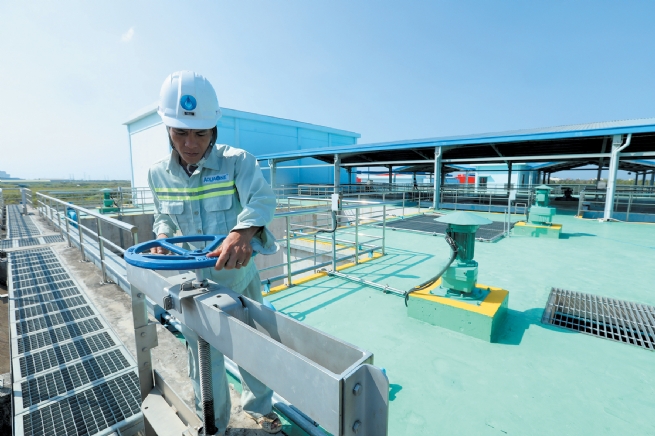
At the 30th anniversary of Vietnam-ADB partnership in mid-March, ADB President Masatsugu Asakawa said that the Asian Development Bank (ADB) plans to mobilize up to US$3 billion for about 23 projects in Vietnam in 2023-2026.
To have such great resources in the next three years, the positive result of the 30-year partnership cannot be denied. In the last 30 years, ADB’s cumulative assistance to Vietnam has amounted to about US$18 billion, improving regional connectivity; strengthening environmental management and green investment; promoting the transition to climate-resilient development; enhancing access to education, health, and social services; and supporting development of ethnic minority communities.
Active support for Vietnam
ADB pledged US$2.1 billion to Vietnam to carry out the Just Energy Transition Partnership Agreement (JETP) as well as the Energy Transition Mechanism (ETM) – a new financial tool for coal-fired thermal power plants that will soon stop operating to use cleaner energy sources. “This is a special opportunity for us,” Mr. Asakawa said.
Export-Import Bank of the United States (EXIM) President and Chair Reta Jo Lewis and Vietnam Development Bank (VDB) Chairman Le Van Hoan signed a US$500 million memorandum of understanding (MOU) to facilitate the financing of U.S. exports to Vietnam during EXIM’s visit to Vietnam from March 18 to 23, 2024. EXIM will work closely with Vietnam Development Bank to identify infrastructure, renewable energy and other projects to promote the green transition in Vietnam.
“The MOU we signed demonstrates our two countries’ shared commitment to strengthening the US-Vietnam trade relationship and working to create opportunities that help brace up our two countries’ economies,” said EXIM President Lewis.
On March 6, 2024, the International Finance Corporation (IFC) announced a credit worth US$64 million for Sermsang Palang Ngan Company Limited (SPN) through a green loan mechanism to boost the development of many renewable energy projects in Thailand, Indonesia and Vietnam to address energy needs in the region.
Recently, IFC also invested up to VND3,500 billion (about US$150 million) in sustainable bonds in local currency issued by BIM Land Joint Stock Company and its subsidiary Thanh Xuan Joint Stock Company, to help the issuers expand their business while creating jobs, enhancing competitiveness and supporting Vietnam’s low-carbon growth model.
Mr. Thomas Jacobs, IFC Country Director for Vietnam, Cambodia and Laos, said, private capital is key to Vietnam’s green transition. “The issuance of the first local currency sustainability-linked bonds (SLBs) in the country will signal the viability of innovative green financing instruments as an alternative source of capital for climate-smart projects. The IFC’s funding will also encourage developers to align their interests with responsible investment and to mobilize funding from green capital markets, paving the way for a sustainable tourism sector,” he said.
To date, IFC has committed over US$900 million in long-term finance to support climate-related projects in the country. The IFC’s commitments in Vietnam reached close to US$1.9 billion in fiscal year 2023, ending June 30, helping local companies recover from COVID-19 and navigate the challenging internal and external environments.
Vietnam and the World Bank (WB) agreed to accelerate the implementation of existing projects and promote game-changing projects within the framework of a US$5-7 billion loan for Vietnam in three years to come, according to the agreement signed between Prime Minister Pham Minh Chinh and WB President Ajay Banga in Dubai in December 2023 on the sidelines of the 28th United Nations Conference of the Parties on Climate Change (COP28). Mr. Banga affirmed that the WB always considers Vietnam an important partner and it will continue to accompany and support Vietnam in meeting its development goals.
Previously, the World Bank Group Board of Directors approved a package of credit worth US$ 263.9 million from the International Development Association for Vietnam to support the country’s efforts to achieve an inclusive, green, and digitally-driven economic recovery with reforms aimed to assist households and businesses and expand renewable energy.
“Reforms supported by this credit are expected to support Vietnam’s ongoing recovery from the COVID-19 pandemic and subsequent commodity price shocks while paving the way for more inclusive, greener, and digital-friendly development,” said Carolyn Turk, WB Country Director for Vietnam.
Vietnam’s adaptability
HSBC Vietnam announced its commitment to arranging up to US$12 billion of direct and indirect sustainable financing for Vietnam and the corporate sector in the country by 2030. The funding targets to support the Vietnamese Government’s aspiring climate goals and its COP26 commitments to become a net zero economy by 2050. The bank expressed its plan to financially and expertly back corporates’ promising and critical green and sustainable projects in Vietnam, which play a vital role in decarbonizing the country’s economy.
“So far, we have supported a variety of different sectors across the public and private sectors, including pure green players (like renewables, water and waste), those vulnerable to climate change risks, such as agriculture, and others in the manufacturing sector (like textile and garment and electronics),” said Mr. Daniel Small, Head of Structured Banking & Sustainable Finance at HSBC Vietnam.
According to HSBC, Vietnam has publicly announced a set of ambitious sustainability targets, including commitments to achieving net zero emissions by 2050. The country expressed its determination by becoming the 12th country to submit its updated Nationally Determined Contribution (NDC) in 2020. Since then, multiple strategies and policies have been created to realize these commitments. Mr. Daniel Small affirmed that general policies are supportive of green and sustainable economic development.
Vietnam’s national green growth strategy in 2021-2030, with a vision to 2050 are testament to the country’s efforts. Meanwhile, the JETP Resource Mobilization Plan, announced at COP28, is currently being prepared for implementation and piloting.
The Power Development Plan VIII (PDP8) and its upcoming implementation plan have revealed huge potential for investment in renewable energy in targeting up to 40% of renewable energy in the energy structure by 2030. Since it became the third country to enter into JETP, Vietnam has continued to work on its legal framework while building a mechanism for implementation and identification of pilot projects. This is pushing positive changes in its legal environment, paving the way for future private investments in its energy transition.
Vietnam’s sustainable finance market currently consists of green credit, green securities and green bonds. Outstanding green credit has posted significant average growth of over 20% a year, or higher than the average credit growth in the economy in the 2017-2022 period.
As of June 2023, 43 credit institutions had participated in financing green and sustainable projects as of June 2023. Compulsory environmental, social, governance (ESG) disclosures and the launch of the Vietnam Sustainability Index (VNSI) for listed companies have partly resolved problems in transparency and information asymmetry. From 2019-2023, Vietnam issued over US$1 billion worth of green bonds to fund projects in renewable energy, waste, and agriculture.
Challenges to sustainable development
Mr. Banga especially appreciated the efforts and determination of the Vietnamese government in green transformation, climate change response and sustainable development, and the implementation of a project to plant 1 million hectares of high-yield, low emissions rice, considering this a model WB project in green agriculture around the world that helps reduce methane emissions and brings clear financial benefits to people through the carbon credit mechanism.
Meanwhile, Mr. Asakawa expressed his appreciation of Vietnam’s participation in resolving global issues such as empowering women and, especially, its commitment, vision, determination, effort and solutions in response to climate change and achieving net-zero emissions by 2050.
However, according to HSBC, one of the main challenges in sustainable development and financing is the lack of a detailed classification system, especially in defining “sustainable” and “green”. Though the government is working on the legal framework, the banking sector still mainly relies on internal monitoring. The lack of clear regulations also leads to hesitation to undertake large sustainability projects that require complex financing.
ESG disclosures are also an ongoing challenge that is worth mentioning. Over 90% of Vietnamese companies are small and medium in size but only listed companies are required to report ESG performance and strategy in their annual reports.
At the same time, the current sustainability standards for Vietnamese corporates also pose challenges in financing. Mr. Small said, since the country’s official standards are not available or set for future implementation, financial institutions like HSBC must follow and adapt to international standards. “These standards may be too advanced for most firms, which prevent them from accessing sustainable financing,” he noted.
According to the WB, Vietnam is one of the countries that are most vulnerable to climate change. Without appropriate adaptation and mitigation measures, it is estimated that climate change will reduce 12-14.5% of its GDP annually by 2050 and could put up to 1 million people into extreme poverty by 2030. To implement a climate-resilient development roadmap and reach net-zero emissions, Vietnam is estimated to need to invest an additional 6.8% of its GDP, equivalent to US$368 billion, from now to 2040.
With the right policies and strategies in place, Vietnam could leverage its decarbonization activities to achieve development goals, so that net greenhouse gas emissions reach zero without slowing GDP growth.
(Source: Vietnam Business Forum)




